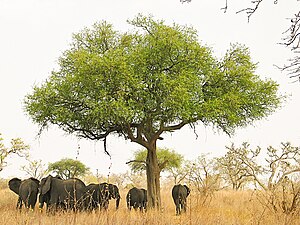Waza National Park
| Waza National Park | |
|---|---|
|
IUCN category II (national park)
|
|

Elephants in Waza National Park
|
|
| Location | Far North Province, Cameroon |
| Coordinates | 11°20′N 14°44′E / 11.333°N 14.733°ECoordinates: 11°20′N 14°44′E / 11.333°N 14.733°E |
| Area | 1,700 km2 (660 sq mi) |
| Established | 1934 |
| Governing body | Cameroon Ministry of Environment and the Protection of Nature |
Waza National Park (French: Parc National de Waza) is a national park in the Department of Logone-et-Chari, in Far North Region, Cameroon. It was founded in 1934 as a hunting reserve, and covers a total of 1,700 square kilometres (660 sq mi). Waza achieved national park status in 1968, and became a UNESCO biosphere reserve in 1979.
For the preservation and conservation of the biodiversity of the park, a Management Master Plan was drawn up in 1997, reported to be the first of its kind in Cameroon. The park is adjacent to the Chingurmi-Duguma sector of Nigeria's Chad Basin National Park. There is also a proposal to combine this park with the Waza Logone floodplain as a Ramsar Site. The forest dwellers who had their villages within the park were resettled on the borders of the park, after it was established. This was done with the objective of creating a social buffer to poaching activities and preserve the park's resources.
The dominant vegetation is in the transition zone between the Sahel and Sudan savanna, containing acacia and open Yaéré savannah forests. The prominent faunal species reported to inhabit the park are: West African lion, African bush elephant, hyena, hartebeest, roan, Buffon's kob, waterbuck, reed, gazelle, Sudan cheetah and West African giraffe. The avifauna reported are geese, egrets, North African ostriches, herons, pelicans, Saddle-billed storks and ibis.
...
Wikipedia

